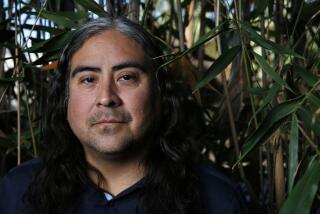JAZZ SPOTLIGHT
- Share via
WYNTON MARSALIS & THE LINCOLN CENTER JAZZ ORCHESTRA
“Blood on the Fields”
Columbia/Sony
* * * *
“When we were putting some of the music together,” said Wynton Marsalis at the time “Blood on the Fields” was in rehearsal, “I had to keep saying to the cats, ‘This is not noise, man. It sounds like noise, but it’s not. If we keep playing it, it’s going to come clear.’ ”
Give Marsalis an “A” for assurance. And accuracy. The music to “Blood on the Fields” has become so “clear” that it earned its composer this year’s Pulitzer Prize for music and some of the most complimentary press ever received by a jazz musician.
But anyone who seriously thought this score sounded like “noise” just wasn’t listening. Although the live performance of the work at the Dorothy Chandler Pavilion in January had some glitches, the recording provides much more thorough, and ultimately much more convincing, evidence of Marsalis’ remarkable achievement.
For one thing, the story, which seemed to move in fits and starts in live performance--due in part to difficulties understanding some of the words--becomes much more distinct, and therefore much more effective as a narrative continuity. The slave passage and life in the New World of the two principal characters, Jesse and Leona, emerges as a poignant, multi-leveled tale. Its juxtaposition of the personal relationship between the two with the broader social issues of slavery brilliantly circumvents blame and shame in favor of character and self-reliance.
Or, as Marsalis puts it in the recording’s program notes, “ ‘Blood on the Fields’ details in music what I feel it takes to achieve soul: the willingness to address adversity with elegance.”
And the music’s role in structuring and advancing the action is also more apparent. Marsalis’ influence from Charles Mingus and, especially, Duke Ellington, is apparent. But the influence has much more to do with instrumentation and timbre than with the essentials of the music itself. In fact, it is an extremely eclectic score, roving freely and compellingly from New Orleans street music to bebop, from urban swing to avant-garde, the blues and boogie. In short, Marsalis has dipped, appropriately, into the entire stream of African American musical creativity to build a foundation for his story.
The playing is universally well done, filled with the sound of individual personalities blending their uniqueness into a communal musical whole. Cassandra Wilson’s dark, almost weary-sounding voice is perfect for the role of Leona. Miles Griffith is appropriately noble as Jesse, the character who must experience the most transforming epiphany. And Jon Hendricks brings his wit, wisdom and sheer sense of swing to every note he sings.
Are there problems? A few. The Greek chorus readings from the orchestra continue to sound stiff and contrived. And the score, for all its appeals, would have benefited from a few more impactive melodic segments.
More important, however, the recording thoroughly proves that “Blood on the Fields” deserved its Pulitzer. That Marsalis’ leap of imagination--his accurate belief that jazz has the power, breadth and emotional depth to support a full-scale dramatic work--was one of the most inspired artistic actions of the ‘90s.
Albums are rated on a scale of one star (poor), two stars (fair), three stars (good), four stars (excellent).
More to Read
The biggest entertainment stories
Get our big stories about Hollywood, film, television, music, arts, culture and more right in your inbox as soon as they publish.
You may occasionally receive promotional content from the Los Angeles Times.










